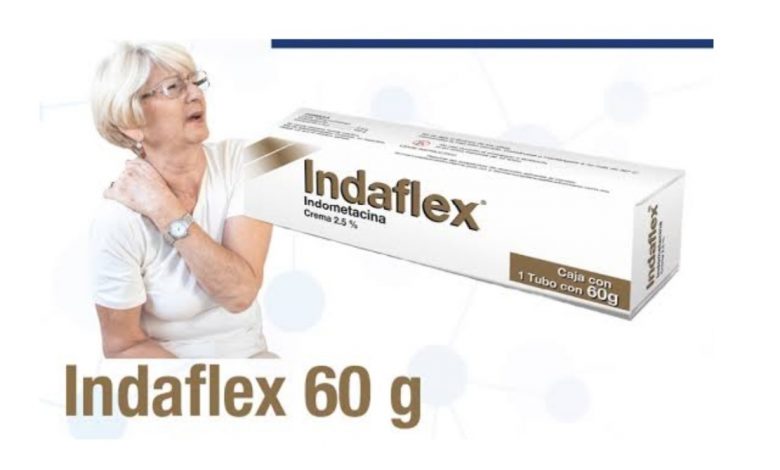Indaflex Cream: Uses, Benefits, How to use, Side Effects

What is Indaflex Cream?
Indaflex is a Mexican brand of indomethacin cream used in the treatment of traumatic or rheumatic muscle and joint pain. It is indicated for the treatment of inflammatory and painful articular and peri-articular diseases due to rheumatic conditions (rheumatoid polyarthritis, degenerative arthrosis process), traumatic conditions (sprains, bruises, tendonitis, muscle stretches) or circulatory conditions (venous thrombosis) and gout treatment.
Each 100 g of Indaflex Cream contains indomethacin 2.5g as the active ingredient. The medication is available in, 40g, 60g, and 100g tubes.
Advantages
Indaflex cream has both powerful anti-inflammatory and analgesic effects, but also the uricosuric effect that makes it useful for gout crises, rheumatoid arthritis, and degenerative arthritic processes that are non-respondent to first-line anti-inflammatory drugs.
Indaflex cream as a pharmaceutical form is also associated with topical massage which has fewer side effects than systemic administration, especially for sub-acute or chronic diseases.
How should I use Indaflex Cream?
Apply 0.5-1 g of Indaflex cream, 3 -4 times per day (preferably after a warm bath) on the painful area and gently massage. The duration of treatment depends on the physician’s indication and the obtained therapeutic effect.
After being absorbed through the skin, reduce the production of a substance called prostaglandins involved in inflammation, relieve pain and inflammation associated with osteoarthritis, shoulder peri-arthritis, tendonitis, tendon, tendon inflammation around, (such as tennis elbow), muscle pain, posttraumatic on the humerus.
Is Indaflex cream safe during pregnancy?
No, if you are pregnant, you should not use Indaflex cream unless your doctor tells you to. Using Indaflex cream during the last 20 weeks of pregnancy can cause severe heart or kidney problems in the unborn baby and possible complications with your pregnancy.
Can a breastfeeding woman use Indaflex cream?
No, Indomethacin is known to pass into breast milk and is best avoided during breastfeeding. Indaflex cream may temporarily affect fertility (ability to have children) in women. It may not be safe to breastfeed while using this medicine. Ask your doctor about any risks.
Indaflex cream is not approved for use by anyone younger than 14 years old.
What are the possible side effects of Indaflex cream?
The most common side effects of Indaflex cream include:
• indigestion,
• nausea,
• headache, and
• dizziness.
Tell the doctor if you have any side effect that bothers you or that does not go away.
Indaflex cream may cause serious side effects including:
• skin rash,
• vision changes,
• swelling,
• rapid weight gain,
• shortness of breath,
• loss of appetite,
• upper stomach pain,
• nausea,
• vomiting,
• diarrhea,
• unusual tiredness,
• itching,
• flu-like symptoms,
• dark urine,
• yellowing of the skin or eyes (jaundice),
• bloody or tarry stools,
• coughing up blood or vomit that looks like coffee grounds,
• little or no urination,
• swelling in your feet or ankles,
• pale skin,
• lightheadedness, and
• cold hands and feet.
Get medical help right away, if you have any of the symptoms listed above.
These are not all the possible side effects of Indaflex cream. For more information, ask your doctor or pharmacist.
Call your doctor for medical advice about side effects. You may report side effects to FDA at 1-800-FDA-1088.
What drugs should I avoid while using Indaflex cream?
Ask your doctor before using Indaflex cream if you take an antidepressant. Taking certain antidepressants with an NSAID may cause you to bruise or bleed easily.
Ask a doctor or pharmacist before using Indaflex cream with any other medications, especially:
• A blood thinner–warfarin, coumadin, jantoven
• Cyclosporine
• Heart or blood pressure medication, including a diuretic or “water pill”
• Lithium
• Probenecid
• NSAIDs (nonsteroidal anti-inflammatory drugs)–aspirin, ibuprofen (Advil, Motrin), naproxen (Aleve), celecoxib, diclofenac, meloxicam, and others.
Recommendations
- Read the leaflet before use.
- Keep out of reach of children.
- Store at temperatures below 25ºC, in original packaging.
- Do not use it after the expiration date printed on the secondary packaging.





